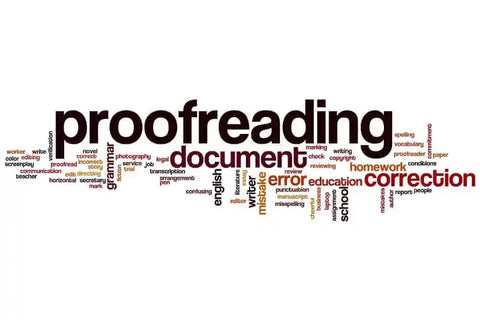Drafting Your Thesis or Dissertation and Finding Your Perfect Proofreader
If you are busy drafting chapters of your thesis or dissertation for your supervisor and discovering just how many aspects of a long research text require exacting attention to achieve precision in content and layout, you may have also begun considering the services of a professional proofreader. If so, you will need to choose one with care, focussing on the specialisation and experience of the proofreader. A professional who works primarily on scientific or academic documents in your field is usually the best choice. Many services can be found online, and the advice of colleagues and mentors may be especially helpful, but finding the perfect proofreader can be very personal and extremely challenging, as well as incredibly beneficial in professional terms.
An effective way in which to begin working with proofreaders while you are also working at drafting thesis or dissertation chapters is to have each chapter proofread before you share it with your supervisor or other committee members for assessment and feedback. If English is not your second language or you struggle with writing sophisticated prose or you simply possess neither the penchant nor the patience for the nitpicking associated with effective academic or scientific proofreading, you may in fact need to seek the assistance of a proofreader or editor to ensure that your writing communicates effectively. Even if your need is not so great, a proofreader can help you avoid the confusion caused by errors and awkward constructions. Keep in mind that allowing your mentors to focus on your research rather than your mistakes is always the best policy.
The work a proofreader does on your chapter draft will not be as crucial as the proofreading of your final thesis or dissertation, but it will certainly help you present a better document to your committee. The results will also help you decide whether that proofreader is a good fit for your work. Even if you are not entirely satisfied with the proofreading, careful instructions and discussion can resolve many issues, so you may not want to move along to a new proofreader for the next chapter without first trying to negotiate a better approach to your work with the first proofreader. On the other hand, if the results were not satisfactory and the proofreader seems less than flexible, it may be a good idea to seek a different professional who will also offer you a different perspective on your work and perhaps a different approach to editing it as well. If you are hiring proofreaders directly, switching will require more work than if you are using a service that has many proofreaders available. With a service, there is usually no guarantee that you will or will not get the same proofreader the second time around, so it is important to express your wishes by requesting either a different one or the same proofreader for the next and subsequent chapters.
Ideally, once you have drafted all your chapters and are ready to put them together into the formal thesis or dissertation, you will also have found a proofreader who understands your research, respects your writing style and formatting preferences, and genuinely helps you improve your writing and polish your thesis or dissertation for a successful examination. No doubt you will also have learned a great deal from your proofreader’s corrections and comments that will serve you well in a career of research, writing and publishing. Finally, you will have gained a silent partner of sorts who will be pleased to proofread and perfect your writing for future successes.
Why Our Editing and Proofreading Services?
At Proof-Reading-Service.com we offer the highest quality journal article editing, dissertation proofreading and online proofreading services via our large and extremely dedicated team of academic and scientific professionals. All of our proofreaders are native speakers of English who have earned their own postgraduate degrees, and their areas of specialisation cover such a wide range of disciplines that we are able to help our international clientele with research editing to improve and perfect all kinds of academic manuscripts for successful publication. Many of the carefully trained members of our manuscript editing and proofreading team work predominantly on articles intended for publication in scholarly journals, applying painstaking journal editing standards to ensure that the references and formatting used in each paper are in conformity with the journal’s instructions for authors and to correct any grammar, spelling, punctuation or simple typing errors. In this way, we enable our clients to report their research in the clear and accurate ways required to impress acquisitions proofreaders and achieve publication.
Our scientific proofreading services for the authors of a wide variety of scientific journal papers are especially popular, but we also offer manuscript proofreading services and have the experience and expertise to proofread and edit manuscripts in all scholarly disciplines, as well as beyond them. We have team members who specialise in medical proofreading services, and some of our experts dedicate their time exclusively to dissertation proofreading and manuscript proofreading, offering academics the opportunity to improve their use of formatting and language through the most exacting PhD thesis editing and journal article proofreading practices. Whether you are preparing a conference paper for presentation, polishing a progress report to share with colleagues, or facing the daunting task of editing and perfecting any kind of scholarly document for publication, a qualified member of our professional team can provide invaluable assistance and give you greater confidence in your written work.
If you are in the process of preparing an article for an academic or scientific journal, or planning one for the near future, you may well be interested in a new book, Guide to Journal Publication, which is available on our Tips and Advice on Publishing Research in Journals website.







